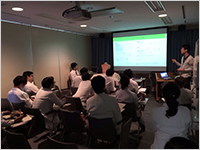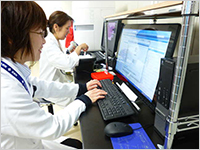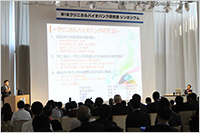Enlarge Image Information system in the Okadai Biobank is directly connected with the electronic medical records in the hospital via a de-identification component.
Enlarge Image The first symposium of the Clinical Biobank Study Group on October 2015, gathering many participants from industry, academia, and government.
Enlarge Image
The launch of Okayama University Hospital’s Biobank (Okadai Biobank)
Okayama University Hospital launched its ‘biobank’, the Okadai Biobank, in April 2015. The biobank provides a space in which to store biological specimens from patients who visit or stay in various departments in the hospital, and provides specimens to researchers and scientists both working inside and outside of the hospital. The Okadai Biobank is the latest in a number of biobanks to open in Japan.
The Okadai Biobank supports not only basic sciences but also clinical practice in a broader sense. More specifically, the Okadai Biobank willingly provides its stored biological specimens to private companies for promoting drug discovery and development. This will enable scientists to increase the diversity of accessible drugs in daily clinical practice, as well as providing support to public research institutes for driving medical and pharmacological studies forwards.
The key features of a hospital biobank are 1) the availability of abundant clinical information associated with each biological specimen, 2) the high quality of specimens because of close physical distance from the surgeries, and 3) a rapid and flexible response to request from applicants. In addition, a hospital biobank has the potential to be the central facility for advancing genomic medicine by providing storage for specimens and analytical instruments.
The Okadai Biobank and several other hospital biobanks in Japan jointly established the “Clinical Biobank Study Group” in March 2015 for networking and sharing information. The group had its first symposium in October 2015 in Okayama. Many participants attended from industry, government, and academia to make various presentations and facilitate discussions, all of which indicated high expectations for hospital biobanks and genomic medicine.
The Okadai Biobank and the Clinical Biobank Study Group intend to play an important role in this field in Japan.
Contact:
Professor Shinichi Toyooka M.D., Ph.D.
Okayama University Medical School and Graduate School of
Medicine,Dentistry, and Pharmaceutical Sciences
toyooka@md.okayama-u.ac.jp



